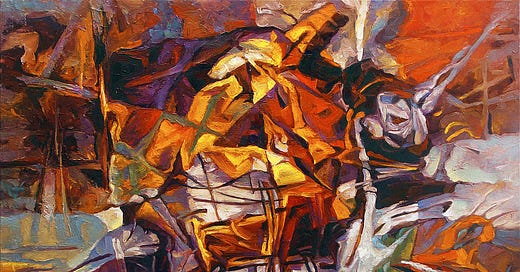In this edition, M2D brings you the first three parts of Zarathustra's Prologue to Thus Spake Zarathustra. After Nietzsche’s text, I included my own marginalia and links to related sources. Stay tuned for parts four through six next week. Subscribe for similar readings of seminal texts.
Part One
When Zarathustra was thirty years old, he left his home and the lake of his home, and went into the mountains. There he enjoyed his spirit and his solitude, and for ten years did not weary of it. But at last his heart changed,—and rising one morning with the rosy dawn, he went before the sun, and spake thus unto it:
Thou great star! What would be thy happiness if thou hadst not those for whom thou shinest!
For ten years hast thou climbed hither unto my cave: thou wouldst have wearied of thy light and of the journey, had it not been for me, mine eagle, and my serpent.
But we awaited thee every morning, took from thee thine overflow, and blessed thee for it.
Lo! I am weary of my wisdom, like the bee that hath gathered too much honey; I need hands outstretched to take it.
I would fain bestow and distribute, until the wise have once more become joyous in their folly, and the poor happy in their riches.
Therefore must I descend into the deep: as thou doest in the evening, when thou goest behind the sea, and givest light also to the nether-world, thou exuberant star!
Like thee must I go down, as men say, to whom I shall descend.
Bless me, then, thou tranquil eye, that canst behold even the greatest happiness without envy!
Bless the cup that is about to overflow, that the water may flow golden out of it, and carry everywhere the reflection of thy bliss!
Lo! This cup is again going to empty itself, and Zarathustra is again going to be a man.
Thus began Zarathustra's down-going.
Part 2
Zarathustra went down the mountain alone, no one meeting him. When he entered the forest, however, there suddenly stood before him an old man, who had left his holy cot to seek roots. And thus spake the old man to Zarathustra:
"No stranger to me is this wanderer: many years ago passed he by. Zarathustra he was called; but he hath altered.
Then thou carriedst thine ashes into the mountains: wilt thou now carry thy fire into the valleys? Fearest thou not the incendiary's doom?
Yea, I recognise Zarathustra. Pure is his eye, and no loathing lurketh about his mouth. Goeth he not along like a dancer?
Altered is Zarathustra; a child hath Zarathustra become; an awakened one is Zarathustra: what wilt thou do in the land of the sleepers?
As in the sea hast thou lived in solitude, and it hath borne thee up. Alas, wilt thou now go ashore? Alas, wilt thou again drag thy body thyself?"
Zarathustra answered: "I love mankind."
"Why," said the saint, "did I go into the forest and the desert? Was it not because I loved men far too well?
Now I love God: men, I do not love. Man is a thing too imperfect for me. Love to man would be fatal to me."
Zarathustra answered: "What spake I of love! I am bringing gifts unto men."
"Give them nothing," said the saint. "Take rather part of their load, and carry it along with them—that will be most agreeable unto them: if only it be agreeable unto thee!
If, however, thou wilt give unto them, give them no more than an alms, and let them also beg for it!"
"No," replied Zarathustra, "I give no alms. I am not poor enough for that."
The saint laughed at Zarathustra, and spake thus: "Then see to it that they accept thy treasures! They are distrustful of anchorites, and do not believe that we come with gifts.
The fall of our footsteps ringeth too hollow through their streets. And just as at night, when they are in bed and hear a man abroad long before sunrise, so they ask themselves concerning us: Where goeth the thief?
Go not to men, but stay in the forest! Go rather to the animals! Why not be like me—a bear amongst bears, a bird amongst birds?"
"And what doeth the saint in the forest?" asked Zarathustra.
The saint answered: "I make hymns and sing them; and in making hymns I laugh and weep and mumble: thus do I praise God.
With singing, weeping, laughing, and mumbling do I praise the God who is my God. But what dost thou bring us as a gift?"
When Zarathustra had heard these words, he bowed to the saint and said: "What should I have to give thee! Let me rather hurry hence lest I take aught away from thee!"—And thus they parted from one another, the old man and Zarathustra, laughing like schoolboys.
When Zarathustra was alone, however, he said to his heart: "Could it be possible! This old saint in the forest hath not yet heard of it, that God is dead!"
Part 3
When Zarathustra arrived at the nearest town which adjoineth the forest, he found many people assembled in the market-place; for it had been announced that a rope-dancer would give a performance. And Zarathustra spake thus unto the people:
I teach you the Superman. Man is something that is to be surpassed. What have ye done to surpass man?
All beings hitherto have created something beyond themselves: and ye want to be the ebb of that great tide, and would rather go back to the beast than surpass man?
What is the ape to man? A laughing-stock, a thing of shame. And just the same shall man be to the Superman: a laughing-stock, a thing of shame.
Ye have made your way from the worm to man, and much within you is still worm. Once were ye apes, and even yet man is more of an ape than any of the apes.
Even the wisest among you is only a disharmony and hybrid of plant and phantom. But do I bid you become phantoms or plants?
Lo, I teach you the Superman!
The Superman is the meaning of the earth. Let your will say: The Superman shall be the meaning of the earth!
I conjure you, my brethren, remain true to the earth, and believe not those who speak unto you of superearthly hopes! Poisoners are they, whether they know it or not.
Despisers of life are they, decaying ones and poisoned ones themselves, of whom the earth is weary: so away with them!
Once blasphemy against God was the greatest blasphemy; but God died, and therewith also those blasphemers. To blaspheme the earth is now the dreadfulest sin, and to rate the heart of the unknowable higher than the meaning of the earth!
Once the soul looked contemptuously on the body, and then that contempt was the supreme thing:—the soul wished the body meagre, ghastly, and famished. Thus it thought to escape from the body and the earth.
Oh, that soul was itself meagre, ghastly, and famished; and cruelty was the delight of that soul!
But ye, also, my brethren, tell me: What doth your body say about your soul? Is your soul not poverty and pollution and wretched self-complacency?
Verily, a polluted stream is man. One must be a sea, to receive a polluted stream without becoming impure.
Lo, I teach you the Superman: he is that sea; in him can your great contempt be submerged.
What is the greatest thing ye can experience? It is the hour of great contempt. The hour in which even your happiness becometh loathsome unto you, and so also your reason and virtue.
The hour when ye say: "What good is my happiness! It is poverty and pollution and wretched self-complacency. But my happiness should justify existence itself!"
The hour when ye say: "What good is my reason! Doth it long for knowledge as the lion for his food? It is poverty and pollution and wretched self-complacency!"
The hour when ye say: "What good is my virtue! As yet it hath not made me passionate. How weary I am of my good and my bad! It is all poverty and pollution and wretched self-complacency!"
The hour when ye say: "What good is my justice! I do not see that I am fervour and fuel. The just, however, are fervour and fuel!"
The hour when we say: "What good is my pity! Is not pity the cross on which he is nailed who loveth man? But my pity is not a crucifixion."
Have ye ever spoken thus? Have ye ever cried thus? Ah! would that I had heard you crying thus!
It is not your sin—it is your self-satisfaction that crieth unto heaven; your very sparingness in sin crieth unto heaven!
Where is the lightning to lick you with its tongue? Where is the frenzy with which ye should be inoculated?
Lo, I teach you the Superman: he is that lightning, he is that frenzy!—
When Zarathustra had thus spoken, one of the people called out: "We have now heard enough of the rope-dancer; it is time now for us to see him!" And all the people laughed at Zarathustra. But the rope-dancer, who thought the words applied to him, began his performance.
###
Marginalia
In the first three parts of the Prologue, Zarathustra speaks with the sun, an old man, and people assembled in a marketplace.
Part 1
Through what Zarathustra says to the sun, we learn what impels him to speak – it’s the weight of the unexpressed:
Lo! I am weary of my wisdom, like the bee that hath gathered too much honey; I need hands outstretched to take it.
But we don’t learn what impelled Zarathustra to leave his home. Couldn’t he “enjoy his spirit and his solitude” somewhere around his lake? Also, since Zarathustra found what he was looking for in the mountains, what turned his heart from enjoyment to weariness? And how strange that one can weary of enjoyment, even after ten years.
The onset of Zarathustra’s weariness probably would have surprised me more before I read the first chapter in Speech and Reality where Eugen Rosenstock-Huessy wonders why we express ourselves at all — why we use speech as a response to our reality. He writes:
Without this effort, we would go to pieces by either too much inner, unuttered desire, or too many impressions made upon us by our environment, too many petrified formulas fettering us from the past, or too much restless curiosity about the future.
And
Anarchy, decay, war, revolution are four forms of social death. Because they are death in its social disguise, and because man is in constant search for life, these social perils, in their variety, compel us to speak our minds.
We also find this sentiment about the weight of the unexpressed in the Gospel of Thomas:
If you bring forth what is within you, what you bring forth will save you. If you do not bring forth what is within you, what you do not bring forth will destroy you.
Zarathustra must bring forth what is within him. The alternative is unthinkable. Still, I wonder what determines exactly how much unexpressed wisdom a man can hold without “going to pieces”. At what point does wisdom start to overflow, and why does the crossing of this threshold cause a man to fall apart?
Part 2
Consumed by his compulsion, Zarathustra meets the old man whom he last saw before the ascent into the mountains. The old man recognizes Zarathustra’s past self transformed into a doomed incendiary with a childlike, dance-like manner, free of loathing — an awakened being descending to the world of the sleepers. Through this descent, Zarathustra loses the illuminated solitude that had sustained him in the cave. He will now have to drag his body himself.
The old man recalls his first encounter with Zarathustra. At that time, Zarathustra carried the ashes of the life he had left into the mountains. Now that Zarathustra carries fire into the valleys, the old man warns him of the “incendiary's doom”.
Perhaps, it’s not surprising that Zarathustra remains undaunted. Apparently, the old man hadn’t even heard about the death of God. How can Zarathustra take seriously this forest dweller’s warnings about the work of an incendiary?
Part 3
In Part 3, having reached the marketplace, Zarathustra doesn’t seem to act as a man overflowing with wisdom. In fact, he seems unwise — a fulminating prophet, utterly unsocialized, without any sense of occasion, failing to register the immediate priorities of the people he hopes to awaken.
This portion of the text precisely illustrates the absurdity of the relationship between prophets “weary of their wisdom” and markets entranced by spectacles. These markets don't even devalue the prophet's wisdom. The autoamputated somnambulists (aka idolworshippers) I wrote about in Maintaining Equilibrium don't even hear the message. Their senses are shut off, as described in Psalm 115:
Their idols are silver and gold,
The work of men's hands.
They have mouths, but they speak not;
Eyes they have, but they see not;
They have ears, but they hear not;
Noses have they, but they smell not;
They have hands, but they handle not;
Feet have they, but they walk not.
Neither speak they through their throat.
They that make them shall be like unto them.
Yea, everyone that trusteth in them.
I wonder if Zarathustra regretted not taking the old man's advice more seriously.







